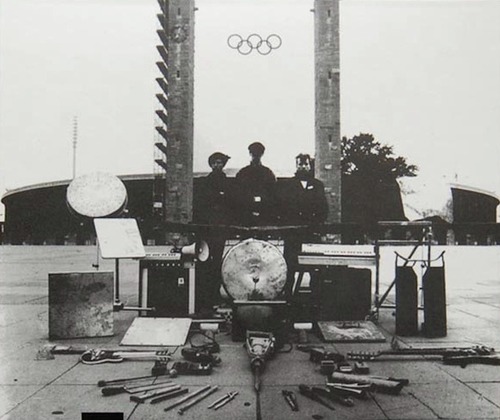Geniale Dilettanten
Par ROD, jeudi 8 décembre 2011 à 13:04 :: LECTURES :: #1115 :: rss

" En comparaison des confortables villages allemands et des riches villes comme Hambourg ou Munich, Berlin était un vaisseau débordant de saleté, de drogues, de suicides, d'incendies, et de controverse, un havre pour les jeunes esprits politisés et les individus en quête. Pour moi c'était la plus belle ville du monde, mais mon père fut choqué lorsqu'il vint me rendre visite, contemplant l'architecture en ruine d'après-guerre et les décorations clairsemées aux fenêtres des grands magasins, s'exclamant que tout était laid. J'essayais de lui expliquer la beauté que je voyais dans la destruction, un espace pour de nouvelles possibilités. Il me dit que j'étais folle et que je ferais mieux de rentrer à New York. Je refusai, ayant rencontré beaucoup trop de gens dont je me sentais proche, en fait j'aurais souhaité déménager ici encore plus tôt pour avoir connu les tous débuts de mon phénomène favori, les Geniale Dilettanten.
Ce groupe de musiciens et d'artistes glorifiaient le fait d'être amateurs depuis le début des années 80, boycottant toute forme de formation académique. Pas plus intéressés d'apprendre les manières de fonctionner dans un monde préconçu, ils insistaient sur le fait d'inventer des formes originales d'art en déconstruisant et en recréant les instruments, les sons, les formes, et la langue. Einstürzende Nebauten, Sprung aus den Wolken, Mark Reeder, Frieder Butzmann, Gudrun Gut, Leben und Arbeiten, Beate Bartel, et Die Tödliche Doris appartenait au groupe initial. La plupart des participants se vantaient d'être d'avides lecteurs, écrivains, peintres, designers tout en composant de la musique, décidant de ce qu'ils considéraient comme digne de confiance et crédible, créant un univers dans lequel ils se sentaient à l'aise, en utilisant les débris qui traînaient dans leur ville pour donner naissance à une nouvelle manière de vivre, consciente, innovante et obstinée.
Ce fut l'atmosphère qui prévalu tout au long des années 80, un miroir de ma propre étrangeté aux attributs communs, me poussant à déployer des talents autrement méprisés ou incompris. Lorsque la situation politique commença à s'effriter en 1989 tout le monde retint son souffle, n'osant croire que cette longue occupation pouvait s'achever, ne réalisant pas encore que cette anarchie incomparable et cette isolation apparente de la ville disparaîtrai, aussi rapidement et aussi complètement que le Mur. Lorsque le Rideau de Fer tomba ce fut la fin d'une époque, la fin des pétrifiés, de l'intemporalité incomparable qui avait régné depuis la guerre, la fin des déprimantes émissions en noir et blanc de la télévision Est Allemande, la fin des points de contrôle et des effrayant chercheurs de corps le long de la frontière, la fin de la Guerre Froide.
Ce fut également la fin du "nous sommes assis dans le même bateau." Le capitalisme avec ses entrepreneurs insatiables franchit le seuil de la ville dans les semaines qui suivirent le bouleversement politique. Les hommes souriants, pleins d'assurance, introduisirent une nouvelle loi de survie: "chacun pour soi," et nous accueillirent dans la nouvelle Guerre Froide du commerce, dressant un mur aussi impitoyable que le précédent, mais cette fois invisible. "
" In comparison to comfortable german villages or wealthy cities like Hamburg or Munich, Berlin was a vessel overflowing with dirt, drugs, suicides, fires, and controversy, a haven for politically minded youth or questioning individuals. I thought it was the most beautiful city in the world, but my father was shocked when he came to visit, gazing at the crumbling postwar architecture and sparse department-store window decorations, exclaiming how ugly everything was. I tried explaining the beauty I saw within the destruction, a space for new possibilities. He said I was crazy and should come back to New York. I refused, having met far too many people I felt closed to, in fact wishing that I had made my move even earlier to have experienced the very beginnings of my favorite phenomenon, the Geniale Dilettanten.
This group of musician and artists had celebrated being amateurs since the early 80s, boycotting any form of academic education. Not interesting in learning how to function for a preconceived world, they insisted on inventing original forms of art by deconstructing and recreating instruments, sounds, forms, and language. Einstürzende Nebauten, Sprung aus den Wolken, Mark Reeder, Frieder Butzmann, Gudrun Gut, Leben und Arbeiten, Beate Bartel, and Die Tödliche Doris belonged to the initial group. Most of the participants prided themselves on being avid readers, writers, painters, or designers besides composing music, deciding on what they considered trustworthy and believable, creating a universe they felt comfortable in, using the leftover debris lying around in their city to give birth to a stubborn, innovative consciousness and way of life.
This was the atmosphere that prevailed throughout the eighties, a mirror of my own estrangement to common attributes, welcoming me to display talents otherwise scorned or misunderstood. When the political situation started crumbling in 1989 everybody held their breath, not daring to believe that this long occupation could be over, not yet realizing that this incomparable anarchic and cut-off semblance of a city would disappear, as quickly and as completely as the Wall. When the Iron Curtain fell it was the end of an era, the end of the petrified, incomparable timelessness that had reigned since the war, the end of depressing black-and-white GDR television shows, the end of checkpoints and scary body searchers at the border, the end of the Cold War.
It was also the end of "sitting in the same boat." Capitalism with its insatiable entrepreneurs crossed the city's threshold within weeks after the political upheaval. Self-assured grins introduced a new mandatory law of survival: "each to his own," and welcomed us into the new Cold War of commerce, erecting a wall as relentless as the one before, but this time invisible. "
The beauty of transgression, Danielle de Picciotto, 2011.

Commentaires
Aucun commentaire pour le moment.
Ajouter un commentaire
Les commentaires pour ce billet sont fermés.